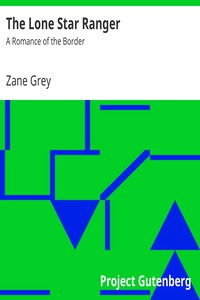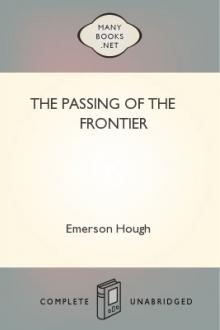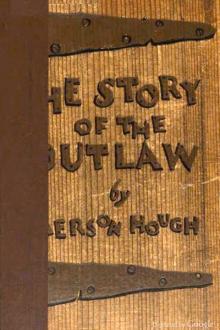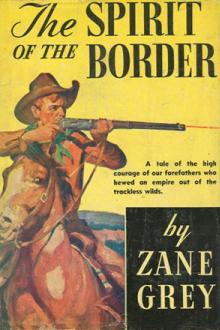The Lone Star Ranger: A Romance of the Border, Zane Grey [free ebook reader for iphone .txt] 📗

- Author: Zane Grey
Book online «The Lone Star Ranger: A Romance of the Border, Zane Grey [free ebook reader for iphone .txt] 📗». Author Zane Grey
Strangely Knell did not even look at the man he was about to denounce. He leaned toward Poggin, his hands, his body, his long head all somewhat expressive of what his face disguised.
“BUCK DUANE!” he yelled, suddenly.
The name did not make any great difference in Poggin. But Knell's passionate, swift utterance carried the suggestion that the name ought to bring Poggin to quick action. It was possible, too, that Knell's manner, the import of his denunciation the meaning back of all his passion held Poggin bound more than the surprise. For the outlaw certainly was surprised, perhaps staggered at the idea that he, Poggin, had been about to stand sponsor with Fletcher for a famous outlaw hated and feared by all outlaws.
Knell waited a long moment, and then his face broke its cold immobility in an extraordinary expression of devilish glee. He had hounded the great Poggin into something that gave him vicious, monstrous joy.
“BUCK DUANE! Yes,” he broke out, hotly. “The Nueces gunman! That two-shot, ace-of-spades lone wolf! You an' I—we've heard a thousand times of him—talked about him often. An' here he IN FRONT of you! Poggin, you were backin' Fletcher's new pard, Buck Duane. An' he'd fooled you both but for me. But I know him. An' I know why he drifted in here. To flash a gun on Cheseldine—on you—on me! Bah! Don't tell me he wanted to join the gang. You know a gunman, for you're one yourself. Don't you always want to kill another man? An' don't you always want to meet a real man, not a four-flush? It's the madness of the gunman, an' I know it. Well, Duane faced you—called you! An' when I sprung his name, what ought you have done? What would the boss—anybody—have expected of Poggin? Did you throw your gun, swift, like you have so often? Naw; you froze. An' why? Because here's a man with the kind of nerve you'd love to have. Because he's great—meetin' us here alone. Because you know he's a wonder with a gun an' you love life. Because you an' I an' every damned man here had to take his front, each to himself. If we all drew we'd kill him. Sure! But who's goin' to lead? Who was goin' to be first? Who was goin' to make him draw? Not you, Poggin! You leave that for a lesser man—me—who've lived to see you a coward. It comes once to every gunman. You've met your match in Buck Duane. An', by God, I'm glad! Here's once I show you up!”
The hoarse, taunting voice failed. Knell stepped back from the comrade he hated. He was wet, shaking, haggard, but magnificent.
“Buck Duane, do you remember Hardin?” he asked, in scarcely audible voice.
“Yes,” replied Duane, and a flash of insight made clear Knell's attitude.
“You met him—forced him to draw—killed him?”
“Yes.”
“Hardin was the best pard I ever had.”
His teeth clicked together tight, and his lips set in a thin line.
The room grew still. Even breathing ceased. The time for words had passed. In that long moment of suspense Knell's body gradually stiffened, and at last the quivering ceased. He crouched. His eyes had a soul-piercing fire.
Duane watched them. He waited. He caught the thought—the breaking of Knell's muscle-bound rigidity. Then he drew.
Through the smoke of his gun he saw two red spurts of flame. Knell's bullets thudded into the ceiling. He fell with a scream like a wild thing in agony.
Duane did not see Knell die. He watched Poggin. And Poggin, like a stricken and astounded man, looked down upon his prostrate comrade.
Fletcher ran at Duane with hands aloft.
“Hit the trail, you liar, or you'll hev to kill me!” he yelled.
With hands still up, he shouldered and bodied Duane out of the room.
Duane leaped on his horse, spurred, and plunged away.
CHAPTER XXIII
Duane returned to Fairdale and camped in the mesquite till the twenty-third of the month. The few days seemed endless. All he could think of was that the hour in which he must disgrace Ray Longstreth was slowly but inexorably coming. In that waiting time he learned what love was and also duty. When the day at last dawned he rode like one possessed down the rough slope, hurdling the stones and crashing through the brush, with a sound in his ears that was not all the rush of the wind. Something dragged at him.
Apparently one side of his mind was unalterably fixed, while the other was a hurrying conglomeration of flashes of thought, reception of sensations. He could not get calmness. By and by, almost involuntarily, he hurried faster on. Action seemed to make his state less oppressive; it eased the weight. But the farther he went on the harder it was to continue. Had he turned his back upon love, happiness, perhaps on life itself?
There seemed no use to go on farther until he was absolutely sure of himself. Duane received a clear warning thought that such work as seemed haunting and driving him could never be carried out in the mood under which he labored. He hung on to that thought. Several times he slowed up, then stopped, only to go on again. At length, as he mounted a low ridge, Fairdale lay bright and green before him not far away, and the sight was a conclusive check. There were mesquites on the ridge, and Duane sought the shade beneath them. It was the noon-hour, with hot, glary sun and no wind. Here Duane had to have out his fight. Duane was utterly unlike himself; he could not bring the old self back; he was not the same man he once had been. But he could understand why. It was because of Ray Longstreth. Temptation assailed him. To have her his wife! It was impossible. The thought was insidiously alluring. Duane pictured a home. He saw himself riding through the cotton and rice and cane, home to a stately old mansion, where long-eared hounds bayed him welcome, and a woman looked for him and met him with happy and beautiful smile. There might—there would be children. And something new, strange, confounding with its emotion, came to life deep in Duane's heart. There would be children! Ray their mother! The kind of life a lonely outcast always yearned for and never had! He saw it all, felt it all.
But beyond and above all other claims came Captain MacNelly's. It was then there was something cold and death-like in Duane's soul. For he knew, whatever happened, of one thing he was sure—he would have to kill either Longstreth or Lawson. Longstreth might be trapped into arrest; but Lawson had no sense, no control, no fear. He would snarl like a panther and go for his gun, and he would have to be killed. This, of all consummations, was the one to be calculated upon.
Duane came out of it all bitter and callous and sore—in the most fitting of moods to undertake a difficult and deadly enterprise. He had fallen upon his old strange, futile dreams, now rendered poignant by reason of love. He drove away those dreams. In their places came the images





Comments (0)